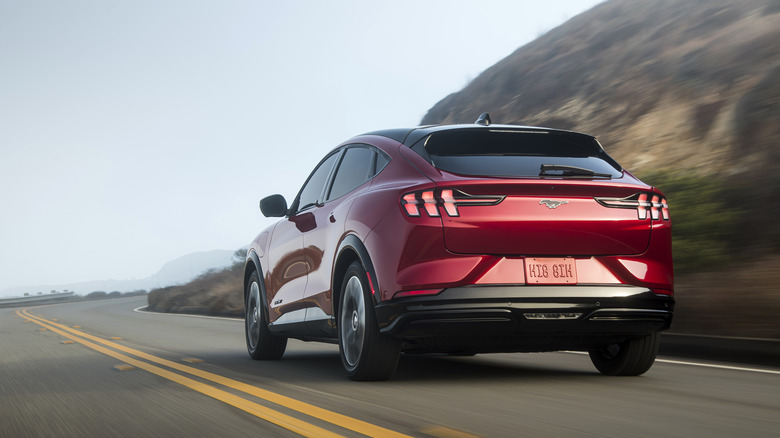
The Blue Oval brand disrupted the electric vehicle (EV) industry when it first launched the Mustang Mach-E as a 2021 model year. Fans of the brand found it to be more than just a touch controversial, using one of Ford's most iconic nameplates on an all-electric crossover, but as time progressed, the Mach-E proved to be a successful and welcome addition to the brand's diverse lineup.
Before long, the Mustang Mach-E started outselling the gas-powered Mustang, a trend that has continued throughout the Mach-E's production run. It's not hard to see why either — with a current starting price of $37,995 (excluding a $1,995 destination and delivery fee), the 2025 Mach-E is attractively priced and affordable for many. But while a sub-$40,000 EV is well within the realms of affordability for many Americans, some of us still prefer to save a bit of money by shopping on the used market.
If a Mach-E appeals but writing a $40,000 check doesn't, perhaps one of the earlier 2021 models will be of interest. As the Mach-E approaches five years old, these earlier models have depreciated quite significantly. According to data collected from CarEdge, a five-year-old Mustang Mach-E will have lost 57% of its original value, based on an average of 13,500 miles per year and providing it's still in good condition. What this means, based on the 2021 Mach-E's starting price of $43,995, is that you should be able to pick up a 2021 Mach-E with 67,500 miles in good condition for just under $19,000. The Kelley Blue Book fair purchase price is a little north of this at $22,970, but it still demonstrates a significant hit in value over the last five years.
The Mach-E isn't a terrible performer in terms of depreciation — models like the Toyota Mirai and Dodge Durango are much worse. But then again, the Mach-E isn't brilliant either. A Toyota RAV4 or Honda HR-V, for example, will retain much more of their original value after five years.
The first reason why the Mach-E loses so much of its value after only five years is simply because it's an electric vehicle. As a general rule, EVs suffer from depreciation much more than gas or even hybrid cars do, so the Mach-E may seem doomed to depreciate from the get-go. Secondly, the price of a brand-new Mach-E has actually been coming down over the years. While this is great news for new buyers, it's not so great for those that purchased one years ago. If the price of a new Mach-E has been discounted, then naturally, the price of used examples must sink to reflect this.
Finally, it's a tricky time at the moment for the electric car market as a whole. Many automakers are backpedaling on their promises for full electrification, and Trump's canceling of the federal tax credit for EVs plus the implementation of tariffs on imported cars has left the automotive market in a bit of a confused state. It's fair to say that this level of disruption will certainly have a lasting effect on car values, but at the moment, it's tough to pinpoint exactly what the outcome will be.















